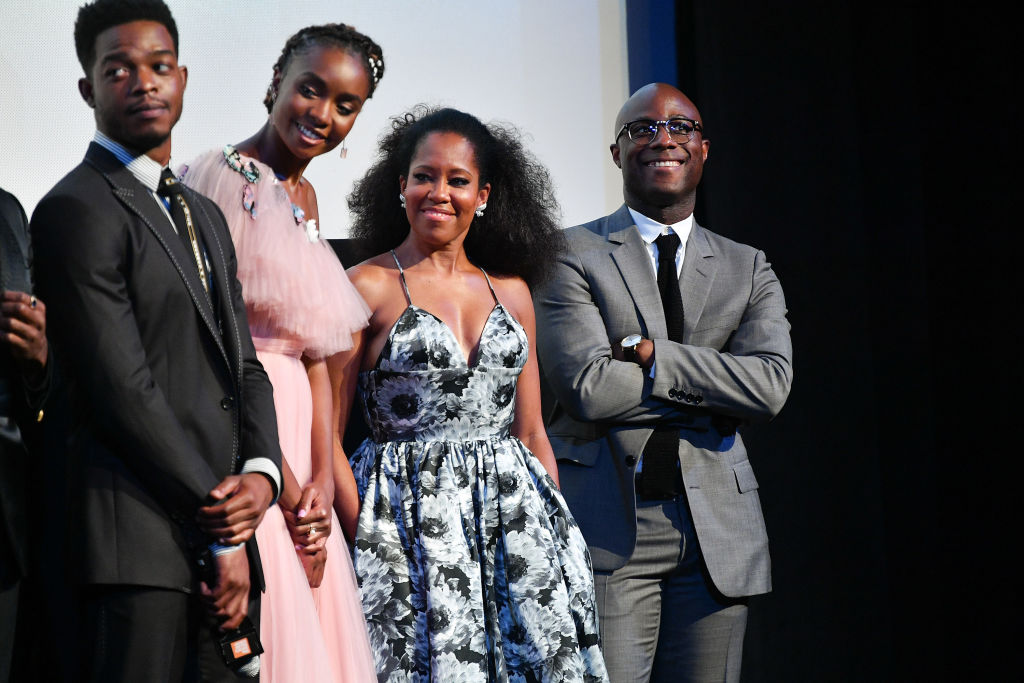
Source: Dia Dipasupil / Getty
Barry Jenkins Says He’s Not An Activist
The 91st Annual Academy Awards are tonight and while we’re happy to see ‘Black Panther,’ Regina King, Mahershala Ali, ‘BlacKkKlansman,’ Spike Lee, Ruth E. Carter and Barry Jenkins nominated across a number of categories we’re convinced that ‘If Beale Street Could Talk’ should have been recognized as a Best Picture nominee. In a year that saw a diverse range of black films – ‘Black Panther,’ ‘BlacKkKlansman,”The Hate U Give’ and ‘Sorry To Bother You’ were among our favorites – ‘If Beale Street Could Talk,’ was, as Regina King called it at one screening attended by our editors, ‘a visual symphony.’ The film truly struck a chord, pun intended, with our Sr. Director of Content Janeé Bolden, who spoke with Barry Jenkins in a one-on-one back in October, just before midterm elections, in a conversation that touched on the magnitude of reimagining James Baldwin for the big screen, the power of revealing the intensity of love between two dark-skinned lead actors and the importance of Regina King’s character as a symbol of black motherhood.
The first question Janeé asked though, was about the music, which speaks so deeply to the emotions conveyed in the film that it may as well have been another character.
Janeé Bolden: Can you talk about the score for the film and the song selection? The film was visually stunning, but the music played such an important role.
Barry Jenkins: “Nicholas Britell who did the score for Moonlight did the score for this film. It’s interesting, we were in Belgium together at this composers conference at this music Q&A and this other composer said “Oh wait, you never heard Nick’s music before you did ‘Moonlight?’” I didn’t realize it, but it was like, no I didn’t — it was just a vibe.
What happened was, as we watched, the film tells us what the music should feel like. We started out with this idea of jazz — you know brass, saxophone, French horn, things like that and as Nick started writing music in that way, we actually realized it wanted it to be strings but as brass compositions, so we organically began the film playing basically as a chamber orchestra but with jazz compositions, and by the end of the film we are playing with jazz instruments these orchestral compositions.
It was a really organic process and what happens is, as you cut the film, when you watch it, the music is meant to feel like Tish is feeling, the way Fonnie is feeling, so a lot of the way the score ends and begins is dictated by the characters.
And then with the needle drops, with the songs that play, I always just have in my head what the characters are vibing with. We’re just mixing and matching, put things in, you know Nina Simone, John Coltrane, Miles Davis, Al Green, all those just things felt appropriate with the time period for these characters.
Janeé Bolden: The film does a great justice to the book and I almost imagined that if James Baldwin could have seen this film he’d have been extremely happy with the result. Did you feel pressure to make the movie as Baldwin would have?
Barry Jenkins: That was part of it for sure. Not that I was asking myself, ‘What would Jimmy do?’ in a certain way, but it was in the back of my mind. And just knowing how much of a cultural critic he was, how engaged he was, you know he wrote film criticism, he wrote about music, it was important for me to have a soundscape that reflected the things he listened to. He actually mentions a lot of music in the book. Music that I felt wasn’t the right fit for what we were doing, but it was a nice compass to have in my head. Not everything in the film is meant to be literally faithful to the book, but to be in the same spirit.
Hit the flip for Jenkins’ take on Kiki Layne and the importance of casting a dark skinned actress for ‘Beale Street.’








Comments
Bossip Comment Policy
Please read our Comment Policy before commenting.